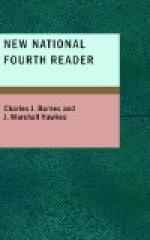Language Lesson.—Let pupils fill blanks in the sentences given below, using in turn, each of the following sets of words:
(1) saw, knew, was, plunged;
(2) sees, knows, is, plunges;
(3) perceived, thought, was, jumped;
(4) perceives, thinks, is, jumps;
(5) noticed, concluded, was, dived;
(6) notices, concludes, is, dives.
He —— in the water a white object, which he —— — the boy’s dress. Then he —— into the roaring rapids.
When the first, third, and fifth sets of words are used, the action is represented as something that is past; but when the second, fourth, and sixth sets are used, the action is represented as going on at the present time.
The forms of verbs (action-words) which are given in the first, third, and fifth sets are used to indicate past time, and are called past tenses; and the forms given in the second, fourth, and sixth sets are used to indicate present time, and are called present tenses.
[17] See fifth paragraph from the end of the passage.
[18] See Lesson L.
* * * * *
LESSON LXII.
e merge’, come out.
vor’tex, water in whirling motion; a whirlpool.
con fid’ed, given into the care of.
vis’i ble, in sight.
spec ta’tors, those who look on.
vent’ured, dared.
re ward’, that which is received in return for one’s acts.
des’ti nies, lives and fortunes.
sup pressed’, kept back.
re doub’led, made twice as great.
* * * * *
ANECDOTE OF WASHINGTON.
PART II.
O, how that mother’s straining eyes followed the struggling youth! How her heart sunk when he went under, and with what joy she saw him emerge again from the waters, and, flinging the waves aside with his strong arms, struggle on in pursuit of her boy!
But it seemed as if his generous efforts were not to succeed; for, though the current was bearing off the boy before his eyes, scarcely ten feet distant, he could not overtake the drowning child.
Twice the boy went out of sight; and a suppressed shriek escaped the mother’s lips; but twice he reappeared, and then, with hands wrung wildly together, and breathless anxiety, she followed his progress, as his form was hurried onward.
The youth now appeared to redouble his exertions, for they were approaching the most dangerous part of the river.
The rush of waters at this spot was tremendous, and no one ventured to approach it, even in a canoe, lest he should be dashed to pieces.




